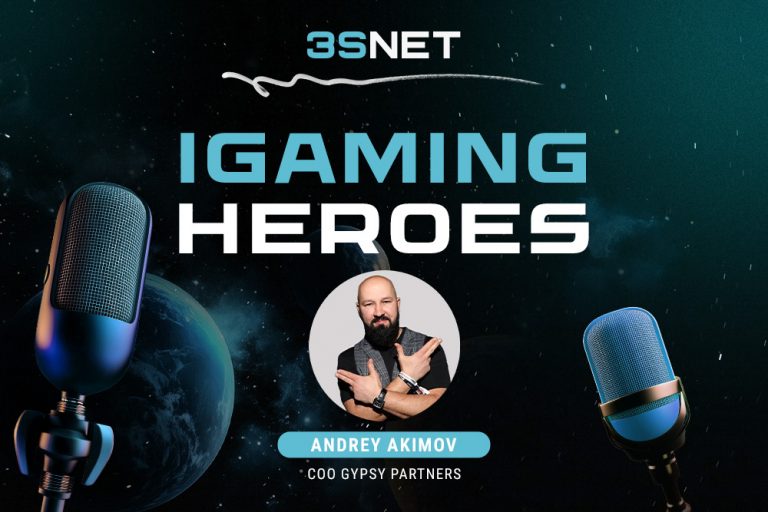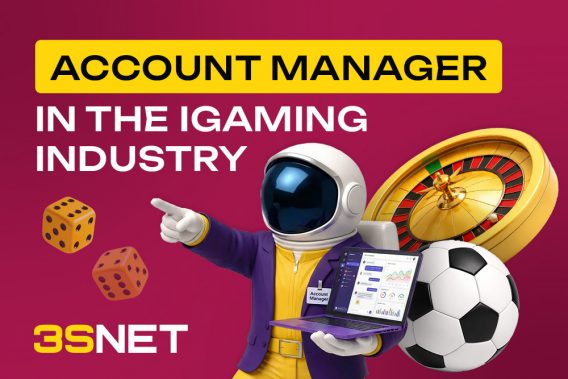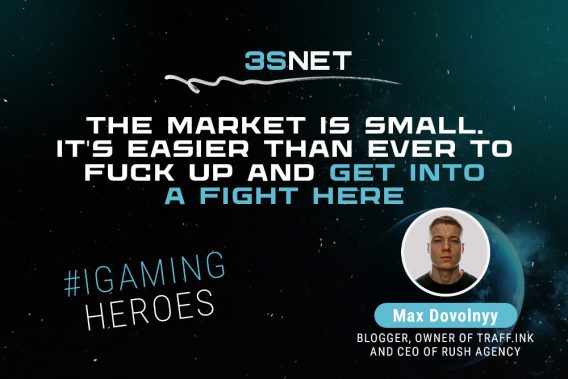
Publication date: 15 April 2025
Meet the new star of iGaming Heroes on 3S.INFO! Andrey Akimov, shares insights on building systematic workflows, effective employee motivation strategies, and defining the role of a true manager. Discover answers to these and more intriguing questions in our exclusive interview!
– How did you get started?
I spent 12 years of my life with the Mercedes-Benz brand and 5 years with BMW. Afterwards, I briefly ventured into consulting, staying there for almost a year. During that period, I had the opportunity to work with sixty-three different companies. This extensive experience proved incredibly valuable to me. Why? Because it was during those years that I developed and refined a key algorithm—a specific set of steps—for establishing a solid foundation in ANY business.
This unique process enables businesses to grow and scale effectively. Thanks to this foundational knowledge, I eventually transitioned into the gaming industry. My entry into iGaming happened somewhat serendipitously, at the invitation of an old friend who happens to own a prominent iGaming project. He asked me to audit/diagnose how the main departments of the company (AFF/RET/VIP/CC) were working and give my feedback.
Over the next three months, I collaborated closely with departmental leaders. Together, we identified areas for improvement across every major division and formulated detailed Action Plans for their future development. I received an offer to stay in the position of CCO. In general, from that moment in my life began this incredible adventure called iGaming!
– Who has been the most memorable person in your career? And why?
Throughout my professional journey, I’ve encountered numerous fascinating individuals whose impact on my path has been profound. Amongst these remarkable figures, two stand out prominently.
Firstly, I’d like to acknowledge the founder of Gypsy Partners. Meeting him marked a turning point in my career within the gambling sector. His exceptional insight, intellectual acumen, and uncanny ability to connect with others left an indelible impression. Coupled with his innate talent for business foresight and charisma, he’s truly a one-of-a-kind individual. Those familiar with Nick personally will instantly recognize the qualities I’m referring to.
Secondly, there’s another figure whom I regard as both mentor and inspiration. He is a rock-solid man, a steely individual, someone who has consistently risen above extremely challenging circumstances. Through countless trials—be it participation in military conflicts decades ago, teaching “Fundamentals of Practical Entrepreneurship” at one of the most prestigious universities, engaging in bare-knuckle fights in the ’90s, or repeatedly founding, losing, and rebuilding diverse business empires—this man never fails to emerge stronger and even more successful after every setback. I am grateful to him for sharing with me his life wisdom, invaluable business experience and generally becoming an example of true strength. I still often use a number of ideas and tips for effective management that I borrowed from him in his day.
– What is the acceptable percentage of entropy that can be tolerated in a company’s system so that the business remains sustainable? Illustrative case study?
This is indeed an intriguing question! On a global scale, an entropy level ranging between 10–20% might conventionally be deemed acceptable for sustaining a business. Nevertheless, these percentages are entirely subjective and don’t inherently reveal meaningful insights. Allow me to elaborate on why.
- We consider this issue in the context of building the system and business processes in the iGaming sphere. Here it is necessary to understand that the level of acceptable % entropy depends on the development cycle of the company, its size, structure, degree of automation of processes, digitalization of the main business-forming departments, the level of qualification of the department heads and, finally, the real values by which the company lives.
- Furthermore, it’s imperative to clarify exactly which segment we’re evaluating. For instance, creative disciplines inherently exhibit greater degrees of entropy. Merely examining aggregate statistics for a particular department provides negligible value.
- Additionally, quantifying this metric poses a considerable challenge for many organizations.
And these are only internal factors, but there are also external factors that are constantly thrown at us by the sphere itself and which can directly affect the level of acceptable % entropy, provided you and your team / system are not ready for them (for example, regulations, payment methods, all sorts of surprises from platforms, etc.). In certain proportions this % has always been, is and will be. In our field, speed is often more important than perfection. Our field requires a certain level of adaptability and expertise to the challenges we constantly face.
If internal systemic inconsistencies arise alongside external obstacles, entropy levels could escalate to become critical for survival. Reflecting on this scenario brings to mind the iconic quote from the film “The Man Who Changed Everything”: “Change or Die!” Crucially, such transformations should occur promptly and professionally.
Understanding the drivers behind key performance indicators and acknowledging individual contributions toward collective outcomes holds paramount significance. Typically, when posed with the inquiry, “What are you managing?” responses encompass various categories such as personnel, assignments, financial assets, and initiatives. In reality, as leaders, we manage two things:
- Attention (our own and our employees’).
- State. There is such a great thesis “state determines the result! And here, speaking of entropy, it is very important to manage its relationship with the state of your people. You will ask how to do that? I think this is a topic for a separate conversation!
– You are in favor of retaining employees and convincing them of the need for change in the company. But where is the line or the signal when it is better not to go down the road of persuasion?
Let me clarify this point.
I’m not advocating for attempting to persuade employees against their will. Rather, I endorse a structured communication style centered on thoughtful reasoning and explanation. Specifically, I avoid commands like, “Do it because I said so!” Instead, I emphasize taking the time to communicate clearly with the team, detailing precisely WHAT changes are being implemented and WHY. The goal is to ensure that employees embrace these adjustments deliberately, comprehending the tangible benefits both for the company and themselves. Should objections arise at this explanatory stage—such as statements like, “But we’ve always done it this way, and everything was perfectly fine until now…”—that signals a need for further investigation. In such cases, it’s crucial to discern the underlying reasons for resistance. Are there hidden anxieties or misunderstandings fueling this stance?
In general, there is such a time model when introducing changes:
- Stage 1 – Why do we need it?
- Stage 2 – There is something in it…
- Stage 3 – We’ve always lived this way!
Each stage usually lasts 2-3 weeks after the introduction of a new process/tool and usually in stage 2 many doubters change their opinion and attitude towards what is happening.
If we talk about when it is better not to spend resources on such a communication model, it is first of all
- Crisis situation that requires extremely clear and specific resulting actions in a limited period of time.
- Conscious non-acceptance of changes, ideas and values of the company, expressed by the employee in toxic behavior. In this case, I often say, “Who can’t be taught? Someone who does NOT need to be taught.” In this case, we may not be on the right track with this employee.
– What is the most common mistake you see in company structure?
The most frequent error observed in company structures is the absence of a transparent hierarchy with clearly defined reporting relationships. Additionally, ambiguity surrounds the responsibilities and roles associated with managerial positions.
– Why are you interested in the iGaming industry? If you’re interested, of course…
- Amazing opportunities and almost unlimited potential for your development and realization.
- Diverse and multi-level challenges in your daily work that will keep you “in shape” and constantly evolving.
- Environment – a large number of smart and ambitious people who push you to achieve and motivate you to get better every day.
- With their vibe and drive at the same time.
– Advertising moment: tell us about your project or yourself.
When discussing oneself, it seems fitting to highlight achievements and colleagues you’ve collaborated with. Thus, this section might not suitably apply to me personally.
As for the project, it is still under NDA, but I hope to be able to announce it to the public soon! Nonetheless, I anticipate revealing more publicly soon. I am actively working with a number of large companies in the format of consulting and advising owners and s-level. It is an amazing experience and an opportunity to dynamically put my skills and experience into practice, as well as to give a certain value to a number of companies. Witnessing transformative growth in leaders through collaboration gives me tremendous satisfaction.
Interested readers can subscribe to the 3SNET channel for updates on upcoming interviews and developments.
Share it with your friends via favorite social media



























